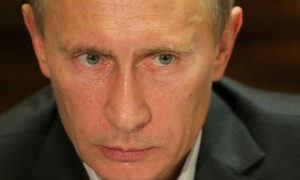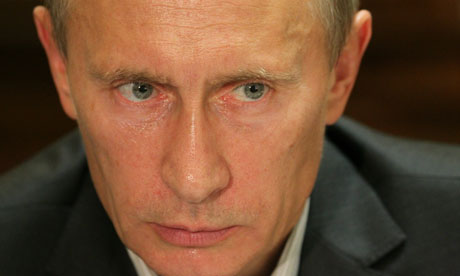Nothing can work without tough inspections and enforcement. And for that we must rely on … Vladimir Putin.
By Charles Duelfer • Politico Magazine
 We don’t yet know all the details of the nuclear agreement that Iran, the United States and five other world powers announced Thursday they are aiming to complete by June 30. What we do know is that any acceptable final deal will depend on a strong weapons inspection element. In his remarks in the Rose Garden, President Obama declared Tehran had agreed to precisely that. “If Iran cheats, the world will know,” he said.
We don’t yet know all the details of the nuclear agreement that Iran, the United States and five other world powers announced Thursday they are aiming to complete by June 30. What we do know is that any acceptable final deal will depend on a strong weapons inspection element. In his remarks in the Rose Garden, President Obama declared Tehran had agreed to precisely that. “If Iran cheats, the world will know,” he said.
Yet weapons inspectors can be no tougher than the body that empowers them—in this instance the UN Security Council. And herein lies the agreement’s fundamental weakness—and perhaps its fatal flaw. Do we really want to depend on Vladimir Putin? Because Russia will be able to decide what to enforce in any deal—and what not to.
Like so many things in in life, one can learn a lot from Saddam Hussein. Certainly Tehran will have learned from Saddam’ s experience in trying to evade the scrutiny of the UN Security Council, weapons inspectors, sanctions, and individual governments.
Sanctions were imposed on Iraq when Saddam invaded Kuwait in 1990. Washington led a response in the UN Security Council that produced a broad coalition unified around the objective of getting Saddam out of Kuwait. Ultimately this required military action—the Gulf War—despite the back-channel efforts of Russia’s special Iraq liaison, Yevgeny Primakov, to broker a deal.
Following the war, the Security Council passed a ceasefire resolution that retained the sanctions on Iraq, but linked them to additional requirements; Iraq must verifiably disclose and account for all its WMD, and Iraq must accept a monitoring system to assure they would not reconstitute their WMD programs in the future.
The Security Council created a new body of weapons inspectors (dubbed UNSCOM) who reported directly to the council. The IAEA also had a role in accounting for the extensive nuclear aspects of Saddam’s programs. This was a case of coercive disarmament as distinct from an arms control agreement like the Nuclear Non-Proliferation Treaty (NPT). It was akin to the disarmament provisions of the Versailles Treaty and ultimately suffered a similar fate.
The authorities that the Security Council mandated for UNSCOM and IAEA inspectors to verify Iraq’s disarmament were extraordinary and probably well beyond anything Iran will accept. In essence, inspectors could go anywhere in Iraq, interview anyone, fly their own aircraft and helicopters, install sensors or cameras anywhere, take possession of documents, etc. Moreover, the chairman or his deputy had authority to designate any location in Iraq as a site for inspection. And that included “no-notice’ inspections.
UNSCOM and the IAEA operated helicopters from a base inside Iraq. We had dedicated missions of the US U-2 aircraft (todays drones would be a cheaper more effective tool to provide aerial surveillance). UNSCOM operated a full-time monitoring center in a dedicated building in Baghdad.
Backing up the inspectors was the threat of force—at least on paper. The resolutions empowering the inspections were passed under Chapter 7 of the UN Charter. The key resolution, UNSCR 687, was a ceasefire resolution. If the Security Council found Iraq in material breech of its provisions, i.e. if Saddam did not comply with the inspectors, military actions could resume. On a few occasions over the ensuing years, some bombing strikes occurred.
And yet, with all of these authorities and tools, we were unable to complete the tasks given by the Security Council. UNSCOM and the IAEA after more than seven years of operations inside Iraq could not verify that Saddam had completely disarmed. Ironically, we later learned, Saddam had, eventually, pretty much given up his WMD program by 1997-98. But we could not verify his claims, and by that time no one was giving him the benefit of the doubt Moreover, as he told us in debriefings, he retained the intent to restart the programs once conditions permitted. It would be interesting to ask Saddam if he thought the IAEA inspectors given the intrusive access we had in Iraq, would be sufficient to detect and deter Iranian cheating.
Does anyone believe such access will be agreed, voluntarily, by Tehran?
In practice, Saddam regularly obstructed and delayed inspectors. He tested, from the start, the will of the Security Council. He cooperated only when he had no other option. And the only reason he cooperated at all, was to get out of sanctions. Saddam pursued two tracks—one of grudging incremental revelations about WMD and the second track was the divide the Security Council and cause sanctions to erode.
Critically, it is important to recall that as the inspection process went on, the unity of in the Security Council decayed. This is natural. As time goes on the objectives and priorities of fifteen nations will evolve and diverge. Saddam recognized and accelerated this trend. Indeed, almost from the start, some members of the Security Council were in close consultation with Iraq. Some had longstanding business relations with Saddam—especially France and Russia.
In manipulating the Security Council, Saddam applied the same tactics to countries as he did to individuals. He offered reward or punishment. He gave some members a stake in his survival. We know all this from debriefings of Saddam and his top lieutenants following the 2003 war as well as from the regime documents we obtained, particularly those concerning disbursement of oil allocations during the so-called Oil-for-Food program.
At the same time as inspectors were struggling to gain access to sites in Iraq, some members of the Security Council were strategizing with Baghdad on how to get rid of sanctions. Saddam knew that some members of the Security Council would not vote to authorize force against Iraq. His downside was thus limited. He worked to maximize his upside, i.e. get the sanctions officially removed, but alternatively cause them to collapse. The role of Russia stands out in this regard.
Russia (and to a lesser extent France), were the key advocates in the Security Council for Iraq. We now know unequivocally, that Saddam was buying influence. When I ran the Iraq Survey Group in 2004, we created a team to collect as much information about Iraq’s resources and how it expended them. The broad goal was to understand Iraq’s strategic intentions and understand where WMD fit in. We had a unique opportunity to record how his regime operated and how it managed to manipulate the international environment. As a priority, we obtained all the Iraqi records of the oil transactions.
Over some political objections, I published these records in the so-called Duelfer Report in 2004 (see “Comprehensive Report of the Special Advisor to the DCI on Iraq’s WMD,” Volume 1, section 2, “Regime Finance and Procurement.” These records (and extensive debriefings of top Iraqi officials) clearly show that Iraq was compensating Russian officials, and other individuals. Included among the beneficiaries in the list of Iraqi oil allocations were “the Russian Communist Party,” “the son of the Russian ambassador,” “the Russian Foreign Ministry,” and, “the Russian Presidential Office.” Putin was also a key actor in many of the Russian commercial entities that were engaged in oil transactions and the illicit export of weapons to Iraq while sanctions were in place.
The list of benefactors is long and includes three or four Americans as well as many foreign governments. But Russia dominated the list. Ultimately the UN sponsored an investigation (chaired by former Federal Reserve Chairman Paul Volcker). Many countries conducted their own prosecutions, but notably Russia did not.
It is also worth remembering that the Russian ambassador to the UN during most of this period was Sergei Lavrov—now foreign minister and negotiating with the P-5 + 1 on the Iran deal. Lavrov, in my judgment, was by far the sharpest ambassador in the Security Council. And like Putin, he is not especially friendly toward the United States.
Iran will have learned from Saddam’s experience too. Tehran will know that support can be bought in the Security Council. Tehran will know that some countries have an immediate financial interest that Tehran can exploit. And some Council members will have a political incentive to build a relationship with Iran. The leaders in Iran, like Saddam in Iraq, play a long game. So do the Russians.
The IAEA inspectors will be reporting whatever evidence they are permitted to collect to a Council that will have competing aims. They will be pressed to make judgments that suit various members. Iran would have to do something incredibly blatant for some Council members to not be able to debate the meaning of the evidence. Council members coached Saddam; they will coach Tehran as well.
Inspectors are also subject to direct actions by interested parties—for and against the inspected country. Iraqi weapons inspectors encountered active steps being taken by Council members to warn Iraq of upcoming inspections. This is to say nothing of the measures Iraq took to penetrate UNSCOM inspection planning and actions. IAEA will also be a prime target for Iranian intelligence. In my experience in Iraq, even with all the measures UNSCOM took, I doubt there was ever a truly “surprise” inspection. The IAEA will be a similar target.
If and when a detailed verification plan is agreed for an Iran nuclear agreement, the inspectors will have less access than in Iraq. The world may point to them as credible investigators—and they are. But whatever they report will go through the kaleidoscope of the Security Council. It will not be the IAEA that decides to re-impose sanctions. It will be the Security Council.
Putin will not give up his right to a veto. Nor will other members. Russia (and others) will have a stake in sustaining access to Iran’s markets, not re-imposing sanctions. The track record of Putin and Lavrov in the Iraq case suggests that they will be working bi-lateral deals with Tehran. Director of National Intelligence James Clapper will get tough questions in closed hearings, not just on whether American intelligence and IAEA inspectors can reliably detect prohibited Iranian nuclear activities, also what deals Moscow or Beijing or others may have with Tehran.
If I were John Kerry, I would not want to be defending a deal that depends upon Vladimir Putin.
Charles Duelfer served as special advisor to the Director of Central Intelligence for Iraq’s weapons of mass destruction and led the Iraq Survey Group, which conducted the investigation of the scope of Iraq’s WMD. Later, at the UN, Duelfer served as the deputy executive chairman and acting chairman of the UN Special Commission on Iraq (UNSCOM) from 1993 until its termination in 2000.
